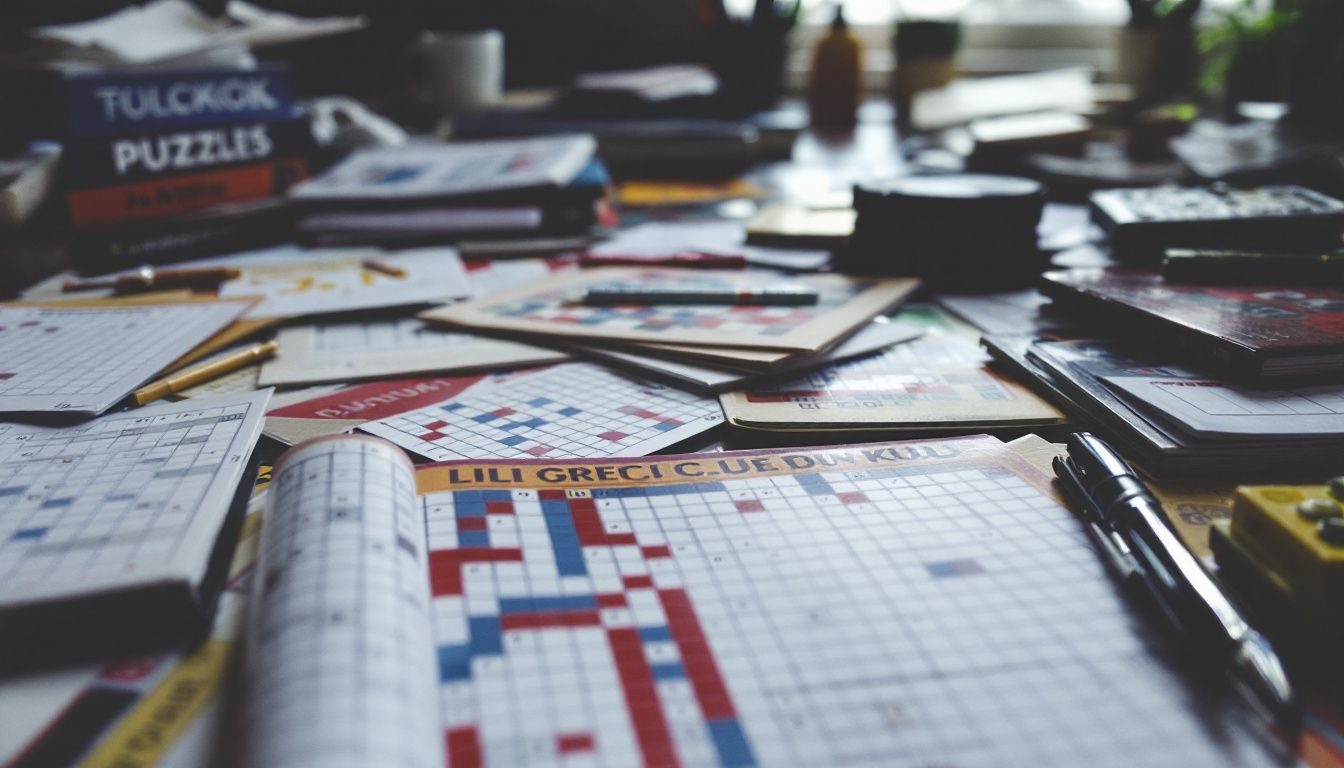Do you ever feel like your brain isn’t as sharp as it used to be? Staying mentally active can help improve memory, problem-solving, and focus. This blog will guide you on simple ways to keep your brain engaged at any age.
Thank you for reading this post, don't forget to subscribe!Keep reading to discover easy tips for better brain health!
Key Takeaways
- Mental challenges like puzzles, strategy games, and learning new skills boost memory and problem-solving at any age.
- Consistent mental activities can lower the risk of dementia and delay cognitive decline in older adults.
- Social engagement through group challenges reduces loneliness while improving brain health and emotional well-being.
- Activities like learning a new language or skill strengthen neural connections, keeping the brain sharp and adaptable over time.
- Regular cognitive exercises support healthy aging by enhancing thinking skills and protecting against memory loss.
Importance of Mental Challenges for Brain Health

Keeping your mind active helps it stay sharp and strong. Mental challenges spark growth in brain cells and support better thinking skills.
Enhancing cognitive functions
Mental exercises keep the brain sharp and active. Activities like solving crossword puzzles or Sudoku stimulate brain cells, improving cognitive function over time. Reading books, learning new skills, or adopting a healthy diet also boosts mental focus.
The “mind diet,” full of whole grains and leafy vegetables, helps protect against memory loss.
Challenging tasks build thinking skills and problem-solving abilities. Studies suggest engaging in complex hobbies can strengthen neural connections, reducing risks tied to cognitive decline.
These efforts improve not just your memory but your overall mental agility—leading smoothly into maintaining essential skills for daily life.
Maintaining memory and problem-solving skills
Playing strategic games like chess boosts problem-solving skills. These activities challenge the brain to think ahead and adapt to changing situations. Solving puzzles, such as crosswords or Sudoku, also sharpens memory while keeping your mind alert.
Studies show that mental exercises can delay memory loss in older adults.
Learning improves brain function at any age. Picking up a new skill or language engages different parts of the brain, strengthening neural connections. Regular cognitive training helps protect against dementia and promotes healthy aging—keeping you mentally fit leads right into other engaging challenges!
Improving overall mental agility
Keeping the brain agile means staying sharp and flexible. Mental exercises like learning a new language or skill boost mental flexibility. These activities create new connections in your brain, keeping it active and adaptable.
Regular challenges, such as solving puzzles or playing games that require strategy, can strengthen thinking skills. Studies show tasks that push the brain improve both speed and clarity in thought.
Staying mentally active helps you adapt to changes and think quickly in daily life situations.
Engaging in Mental Challenges at Any Age
Keeping your brain active can be fun and rewarding. Try activities that push you to think in new ways or solve problems… they help keep your mind sharp at any stage of life!
Playing strategic games
Strategic games like chess, bridge, and even Sudoku challenge your brain in powerful ways. These activities sharpen thinking skills by enhancing memory and decision-making. Regularly playing them can reduce the risk of cognitive decline as you age.
Such games strengthen mental focus and problem-solving abilities. Studies suggest that strategic play keeps brain cells active and healthy, supporting overall cognitive function. Engaging in these games often could help prevent conditions like Alzheimer’s disease while boosting long-term brain health.
Learning new skills or languages
Learning a new language or skill keeps the brain sharp. It strengthens memory, boosts cognitive function, and improves mental focus. Studies show that mastering a musical instrument or foreign language stimulates brain cells.
This activates different parts of the aging brain, keeping it healthy.
These activities also promote lifelong learning by challenging thinking skills. Older adults who engage in such tasks may reduce the risk of dementia prevention while enhancing memory improvement.
Picking up a skill like playing piano or Spanish can be fun and mentally rewarding at any age!
Solving puzzles
Solving puzzles keeps the brain sharp and focused. Activities like crossword puzzles, sudoku, or jigsaw challenges improve problem-solving skills. They also enhance memory by requiring recall and logical thinking.
Studies show regular puzzle-solving lowers risks of cognitive decline, including conditions like dementia or Alzheimer’s disease.
Puzzles boost mental agility at any age. For older adults, engaging in them may help delay memory problems and support healthy aging. Young people can use them to strengthen concentration and critical thinking skills.
Simple daily practices—solving a riddle or completing a sudoku grid—could make a big difference in maintaining brain health over time.
The Impact of Mental Challenges on Cognitive Decline
Mental challenges can keep your brain sharp and delay mental decline—stay curious and keep challenging yourself!
Reduced risk of developing dementia
Engaging in mental challenges like puzzles and strategic games lowers dementia risk. Studies show regular mental activities can reduce the chances of cognitive decline. Activities that stimulate brain cells help maintain their function over time.
Consistent practice keeps thinking skills sharp.
Older adults who stay mentally active often show better memory and problem-solving abilities. Brain training exercises, such as crosswords or learning new skills, improve long-term brain health.
These habits promote healthy aging and may prevent conditions like Alzheimer’s disease or vascular dementia.
Better cognitive performance in later years
Mental challenges like solving puzzles or learning new skills boost brain function. Studies show older adults who engage in complex activities retain sharper thinking skills. Tasks that activate memory and problem-solving parts of the brain help prevent memory loss.
People who challenge their minds often see a reduced risk of cognitive decline, including diseases like Alzheimer’s. Activities such as learning languages or playing strategic games improve long-term cognitive health.
Regular mental exercise works much like physical workouts—keeping your mind strong over time.
Need for preventive mental exercises in older adults
Around 20% of adults over 65 face cognitive decline, which affects memory and thinking skills. Preventive mental exercises can slow down this process. Activities like crossword puzzles, learning new skills, or playing strategy games improve brain function.
Regular challenges keep the mind sharp. These exercises may lower the risk of dementia and Alzheimer’s disease while boosting memory improvement. Engaging in these habits early ensures better cognitive health—leading to emotional benefits found in the next section!
Benefits of Mental Challenges for Emotional Well-being
Mental challenges can lift your mood and create a sense of achievement. They also help foster connections with others, which boosts happiness.
Reduction of feelings of isolation
Group activities like crossword puzzles or learning new skills can help people feel connected. Older adults, in particular, benefit from spending time with others while engaging their brains.
This promotes social interaction and improves emotional well-being.
Staying socially active lowers feelings of isolation and boosts mental health. Playing strategic games or solving puzzles together creates bonds. Collaborative challenges also reduce loneliness by keeping minds engaged in shared tasks.
Improvement of emotional well-being
Engaging in brain-stimulating activities can lift your mood. Crossword puzzles, chess, or even learning a new language spark joy and reduce stress. These challenges keep the mind occupied, leaving little room for negative thoughts.
Socially active games add another layer of happiness by fostering connections.
Mental exercises also fight feelings of loneliness. They motivate older adults to interact with others while improving their emotional health. Group activities like trivia nights or board games encourage laughter and bonding—boosting serotonin levels naturally.
A well-challenged brain feels more balanced and emotionally stable over time.
Practical Tips for Incorporating Mental Challenges
Keep your brain busy with fun and meaningful tasks. Stay curious, try new activities, and enjoy the process of learning.
Setting aside time for brain-engaging activities
Carving out time for brain-engaging activities boosts cognitive function. Dedicate a few minutes daily to solving crossword puzzles or Sudoku. These simple tasks keep the mind sharp and improve problem-solving skills over time.
Learning something new, like playing an instrument or speaking another language, can protect against memory loss. Regular practice strengthens brain cells while creating new neural pathways.
Consistency is key—small efforts every day lead to long-term benefits for brain health.
Importance of social connections in enhancing cognitive benefits
Social connections improve cognitive fitness. Activities like group games or puzzles boost thinking skills and memory. Collaborative tasks bring mental and emotional stimulation, which sharpens the brain over time.
Staying socially active reduces feelings of isolation, linked to poor brain health. Older adults in social groups often show better cognitive performance. Engaging with others also lowers risks of dementia by keeping the mind challenged and focused.
Lifelong Learning and Proactive Approach to Cognitive Health
Keeping the brain active promotes healthy aging. Older adults who engage in lifelong learning activities show better cognitive function and reduced memory problems. Activities like reading, learning new skills, or understanding a different language can strengthen thinking skills.
Preventive measures help maintain cognitive fitness over time. Regular mental challenges delay memory loss and dementia symptoms while boosting overall brain health. Proactively addressing factors like sleep apnea, high blood pressure, and diet also supports long-term cognitive health.
Conclusion
Your brain thrives on challenges, no matter your age. Mental exercises keep memory sharp and boost problem-solving skills. Simple activities like puzzles or learning can lower the risk of cognitive decline.
Staying mentally active also supports emotional health and reduces loneliness. Make time for these activities daily—it’s a smart step toward healthy aging!
